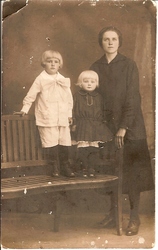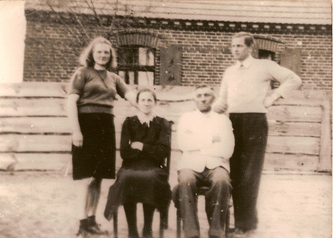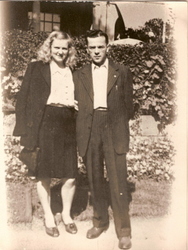Kish Mahoney Holocaust Literature
The Life of Stanislawa Siedlecka - A True Story of a Holocaust Survivor
"I saw the devil once, who knew Satan was so handsome" states the 84 year old holocaust survivor remembering her one sighting of Hitler when she was a teenager. Stanislawa “Stasha” Siedlecka was born 11/9/1925 in Ostrow, Poland (60-70 miles from the Germany border) and she was 14 when she was uprooted from her family and transported by train to a concentration camp rooted deep in Germany. She recalls sitting in a train station for days, waiting as more and more passengers arrived, so the train would be full when transported to the concentration camp Leipzig-Schönefeld. Stasha describes with a vivid memory the 36 tracks at Leipzig for the trains that loaded and unloaded passengers at the concentration work camp. She starts her story with the day that she, her brother, and father were taken from their home with her mother being left behind. Her only sibling Joseph was taken by a German farmer to work as slave labor on his farm, while her father was shipped to a concentration work camp in Germany near the French zone.
Stasha begins her description of Leipzig as a very big and beautiful city, but her only memory of the beauty was from her train ride, as she was never allowed outside the walls of the camp. There were approximately 1000 people in her camp, including Lithuanian, Polish, Czechoslovakian, Italian, Russian, and French prisoners. “Doctors, lawyers, priests, dentists, and anyone who was attractive or smart were taken to the camp” explains Stasha. "Women who were mothers and elders were taken to the camp, the children were left with the elders (known as Grandma) during the work day so that young mothers could work as slave labor", Stasha recollects.
Stasha lived in the camp at Leipzig for 4 years before the camp was liberated by the Russian and Polish armies. Coffee, bread, and rat soup was issued once a day for nutrition and Stasha states, “we all ate the rats, we were so hungry, we ate anything we could so not to die”. Stasha learned the importance of rationing her bread and coffee so that when morning arrived she would have something to eat and drink before she began her journey to work.
Stasha worked 5 days a week, having to walk 4-5 miles each way to and from work, no matter what the weather conditions. She recalls, " some days the snow was up to my waist and the walk to work took up to 3 hours". When she arrived at the factory that made parts for airplanes and war time supplies, she worked 8 or more hours without food or drink, then had to make the return trip back to camp. In the winter months the prisoners were issued wooden shoes and they wrapped old newspapers around their feet and legs for warmth during the long journey to and from the factory.
After work when she returned to the camp the prisoners would have to line up in their barracks to be searched by the German soldiers at which time the prisoners would sing German hymns to appease their critics. “Germany, Germany is better than everything else” was one of the courses they sang according to Stasha. After roll call they lined up in the kitchen to receive their soup, bread, and coffee then returned to the barracks to eat. After Stasha ate her supper she would cry, everyone would argue and fight in order to survive, then they would pray together to stop the fighting and then hug and cry asking each other "why are we fighting?" but after a few hour it would began all over again. Her barracks consisted of 20-25 bunk beds with hay covered in burlap for padding, with each person having their own bunk and one blanket. Stasha can't fight the urge to itch her head as she speaks of the lice infestations in the camps barracks.
Stasha remembers on the weekends when she did not have to work that she simply stayed in the barracks, or if it was summer she would sit outside under the roof of the barracks to shade herself from the sun. Stasha reports that there was no gas chamber or crematoriums in the camp she was in. Stasha does recall one barrack in Leipzig that was used for the torturing and beating of prisoners, as she can still hear their screams and cries for help. The older prisoners would tell the young, “they don’t feel the beating, god is with them, it’s going to be over soon, or pray that they won’t feel it much longer”. Stasha states, “it must have been true because eventually the screams and cries ceased and death overcame those being beaten”. When it was over the prisoners were forced to dig the mass graves for those killed with the remaining prisoners forced to watch those being put into the graves with the German soldiers threatening them stating, “If you try anything we will kill you just the same”. Stasha states, “Fear was all around me, I had no friends because you never knew if someone was going to hit you, and I am still fearful of the Nazi’s coming after me today.”
Stasha was 18 when she was liberated from the camp and had over a 300 mile journey to return to her home in Poland. She states that most of the survivors traveled in groups trying to get back home with some of the journey being by foot and some by train. Snow was so high after the war many froze to death standing upright walking in the snow including German, Polish, and Russian soldiers, as well as camp survivors trying to find their way back home to their families. The dead were everywhere and it was not until late spring when the snow melted that the corpses of the dead were found and removed. Stasha recalls, "the frozen dead bodies looked like trees." It took Stasha at least 3 weeks to make it back to her family in her homeland of Poland.
Stasha recalls that the Russian soldiers were nearly as bad as the German soldiers following the war as they came into the homes of the survivors taking what they wanted and beating those who would not give in. Stasha stated, “The Russians did to the Polish people the same as Hitler, if you did not give them what they wanted they tortured you and stated that you were with Hitler”. Stasha witnessed many Russian soldiers raiding dead bodies of any valuables, even amputating legs off dead German soldiers to steal their boots, or amputating hands to steal their watches or rings.
By the time Stasha made her journey back home her brother had already returned, but it was yet another 2 months before she would see her father. Stasha can still see her father coming down the trail after being picked up by a farmer riding in a wagon of hay with a few other men. Stasha was on her way walking into town to the bakery to buy some fresh baked bread when she heard someone yell “STASHA, STASHA” as he jumped off the wagon, her father ran and hugged her. Even on this joyous journey being reunited with her father walking into town Stasha recalls seeing dead bodies of the German soldiers that were killed by the Russians. Germans were still showing up at their doorsteps with their guns making demands that had to be followed and the Poles were still fearful of their lives.
At the age of 21, Stasha went to live with her Aunt and cousin who owned a butchers store . Above the store was an apartment that Stashas future husband and future aunt lived. Stasha met Edward Dingo an American soldier who came to Poland after the war to visit his Aunt. Edward was 5 years older than Stasha and had been visiting in Poland for several months (his visa was extended 3 times). Stasha recalls that Edward was broke at the time and living and eating on credit from her aunts’ store. Stasha went to her aunt asking, "What should I do, this man is not paying for anything, he is using credit in the store?". Her aunt replied, “Oh Stasha it is only food, we don’t want our people to starve”. They knew each other only 3 weeks when Ed went to the American Embassy in Warsaw to inquire on the papers necessary for he and Stasha to be married. Ed and Stasha were married but only 2 days later Ed had to return to the USA as his Visa had expired. He returned to America and gained employment at the Buick factory in Flint Michigan. It would be another 2 years before Ed would save enough money to have Stasha brought to the USA for their reunion.
Ed and Stasha had 3 children, 8 grand children, and 4 great grandchildren. Edward passed away on Thanksgiving in November of 1999. Stasha is still living at the age of 84, and has many health issues. She is in the process of selling the home that she and Ed raised their family in with plans to move into a nursing home as she does not want to be a burden on her children. To this day Stasha is fearful of the Nazi’s worrying that her conversations may be taped and fearful of the consequences. She worries that there are still people who wear the Nazi swastika that would come after, despite the fact that she has lived a safe and peaceful life in the United States since 1949.
Stasha begins her description of Leipzig as a very big and beautiful city, but her only memory of the beauty was from her train ride, as she was never allowed outside the walls of the camp. There were approximately 1000 people in her camp, including Lithuanian, Polish, Czechoslovakian, Italian, Russian, and French prisoners. “Doctors, lawyers, priests, dentists, and anyone who was attractive or smart were taken to the camp” explains Stasha. "Women who were mothers and elders were taken to the camp, the children were left with the elders (known as Grandma) during the work day so that young mothers could work as slave labor", Stasha recollects.
Stasha lived in the camp at Leipzig for 4 years before the camp was liberated by the Russian and Polish armies. Coffee, bread, and rat soup was issued once a day for nutrition and Stasha states, “we all ate the rats, we were so hungry, we ate anything we could so not to die”. Stasha learned the importance of rationing her bread and coffee so that when morning arrived she would have something to eat and drink before she began her journey to work.
Stasha worked 5 days a week, having to walk 4-5 miles each way to and from work, no matter what the weather conditions. She recalls, " some days the snow was up to my waist and the walk to work took up to 3 hours". When she arrived at the factory that made parts for airplanes and war time supplies, she worked 8 or more hours without food or drink, then had to make the return trip back to camp. In the winter months the prisoners were issued wooden shoes and they wrapped old newspapers around their feet and legs for warmth during the long journey to and from the factory.
After work when she returned to the camp the prisoners would have to line up in their barracks to be searched by the German soldiers at which time the prisoners would sing German hymns to appease their critics. “Germany, Germany is better than everything else” was one of the courses they sang according to Stasha. After roll call they lined up in the kitchen to receive their soup, bread, and coffee then returned to the barracks to eat. After Stasha ate her supper she would cry, everyone would argue and fight in order to survive, then they would pray together to stop the fighting and then hug and cry asking each other "why are we fighting?" but after a few hour it would began all over again. Her barracks consisted of 20-25 bunk beds with hay covered in burlap for padding, with each person having their own bunk and one blanket. Stasha can't fight the urge to itch her head as she speaks of the lice infestations in the camps barracks.
Stasha remembers on the weekends when she did not have to work that she simply stayed in the barracks, or if it was summer she would sit outside under the roof of the barracks to shade herself from the sun. Stasha reports that there was no gas chamber or crematoriums in the camp she was in. Stasha does recall one barrack in Leipzig that was used for the torturing and beating of prisoners, as she can still hear their screams and cries for help. The older prisoners would tell the young, “they don’t feel the beating, god is with them, it’s going to be over soon, or pray that they won’t feel it much longer”. Stasha states, “it must have been true because eventually the screams and cries ceased and death overcame those being beaten”. When it was over the prisoners were forced to dig the mass graves for those killed with the remaining prisoners forced to watch those being put into the graves with the German soldiers threatening them stating, “If you try anything we will kill you just the same”. Stasha states, “Fear was all around me, I had no friends because you never knew if someone was going to hit you, and I am still fearful of the Nazi’s coming after me today.”
Stasha was 18 when she was liberated from the camp and had over a 300 mile journey to return to her home in Poland. She states that most of the survivors traveled in groups trying to get back home with some of the journey being by foot and some by train. Snow was so high after the war many froze to death standing upright walking in the snow including German, Polish, and Russian soldiers, as well as camp survivors trying to find their way back home to their families. The dead were everywhere and it was not until late spring when the snow melted that the corpses of the dead were found and removed. Stasha recalls, "the frozen dead bodies looked like trees." It took Stasha at least 3 weeks to make it back to her family in her homeland of Poland.
Stasha recalls that the Russian soldiers were nearly as bad as the German soldiers following the war as they came into the homes of the survivors taking what they wanted and beating those who would not give in. Stasha stated, “The Russians did to the Polish people the same as Hitler, if you did not give them what they wanted they tortured you and stated that you were with Hitler”. Stasha witnessed many Russian soldiers raiding dead bodies of any valuables, even amputating legs off dead German soldiers to steal their boots, or amputating hands to steal their watches or rings.
By the time Stasha made her journey back home her brother had already returned, but it was yet another 2 months before she would see her father. Stasha can still see her father coming down the trail after being picked up by a farmer riding in a wagon of hay with a few other men. Stasha was on her way walking into town to the bakery to buy some fresh baked bread when she heard someone yell “STASHA, STASHA” as he jumped off the wagon, her father ran and hugged her. Even on this joyous journey being reunited with her father walking into town Stasha recalls seeing dead bodies of the German soldiers that were killed by the Russians. Germans were still showing up at their doorsteps with their guns making demands that had to be followed and the Poles were still fearful of their lives.
At the age of 21, Stasha went to live with her Aunt and cousin who owned a butchers store . Above the store was an apartment that Stashas future husband and future aunt lived. Stasha met Edward Dingo an American soldier who came to Poland after the war to visit his Aunt. Edward was 5 years older than Stasha and had been visiting in Poland for several months (his visa was extended 3 times). Stasha recalls that Edward was broke at the time and living and eating on credit from her aunts’ store. Stasha went to her aunt asking, "What should I do, this man is not paying for anything, he is using credit in the store?". Her aunt replied, “Oh Stasha it is only food, we don’t want our people to starve”. They knew each other only 3 weeks when Ed went to the American Embassy in Warsaw to inquire on the papers necessary for he and Stasha to be married. Ed and Stasha were married but only 2 days later Ed had to return to the USA as his Visa had expired. He returned to America and gained employment at the Buick factory in Flint Michigan. It would be another 2 years before Ed would save enough money to have Stasha brought to the USA for their reunion.
Ed and Stasha had 3 children, 8 grand children, and 4 great grandchildren. Edward passed away on Thanksgiving in November of 1999. Stasha is still living at the age of 84, and has many health issues. She is in the process of selling the home that she and Ed raised their family in with plans to move into a nursing home as she does not want to be a burden on her children. To this day Stasha is fearful of the Nazi’s worrying that her conversations may be taped and fearful of the consequences. She worries that there are still people who wear the Nazi swastika that would come after, despite the fact that she has lived a safe and peaceful life in the United States since 1949.




